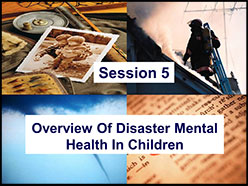Description
This two-part webinar is the fifth session of the series, Disaster Research Training for Children and Families. The series is intended to enhance the infrastructure and to provide the skills, information and resources needed to conduct disaster mental health research with children and families. This session is made up of two 1 1/2 hour webinars, led by Lucy Berliner, MSW.
Learning Objectives
- Assist participants in understanding child mental health issues related to trauma, disaster and terrorism to establish a foundation for disaster mental health research
- Provide a rationale for child mental health screenings and to consider some limitations and problems with screening
Intended Audience
Local Multidisciplinary Research Team (LMRT) members
Disaster Research Training for Children and Families Webinar Series
Session 1: Disaster Research for Children and Families: Universal Training Module
Session 2: Team Building and Culturally Competent Disaster Research
Session 3: Coping and Resilience for Youth in Traumatic Events
Session 4: Research Methodology and Program Evaluation
Session 5: Children's Disaster Mental Health and Child Mental Health Screenings
Session 6: Early Interventions and Psychoeducational Group Interventions with Children
Session 7: Disaster Research Ethics: Gaps, Challenges, and Team Sustainability
Format
The series of seven training sessions was held online, using iLinc web conferencing software. The initial Universal Training Project lasted 1.5 hours. All other training sessions in this series lasted 3.0 hours. Recordings of these sessions are available below.
Session Five Presenter
Lucy Berliner, MSW, is Director, Harborview Center for Sexual Assault and Traumatic Stress and Clinical Associate Professor, University of Washington School of Social Work and Department of Psychiatry and Behavioral Sciences. Her activities include clinical practice with child and adult victims of trauma and crime; research on the impact of trauma and the effectiveness of clinical and societal interventions; and participation in local and national social policy initiatives to promote the interests of trauma and crime victims.
